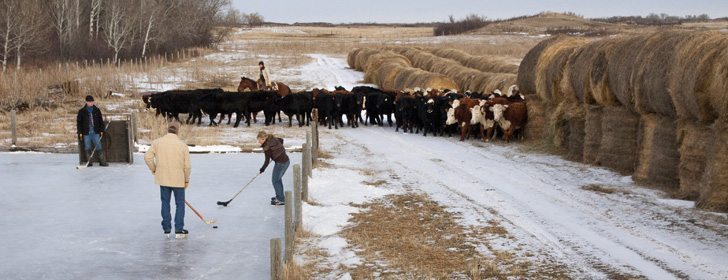Looking to the future | Ranching family talks about succession plan
BRODERICK, Sask. — The Abrahamsons know they are wealthy with faith, friends and family.
David and Rose Abrahamson grew up in Christian homes surrounded by close-knit extended families in communities where good neighbours are valued and respected.
Their four-generation ranch, which was homesteaded in 1903, is tucked along the South Saskatchewan River near Broderick, Sask.
Married since 1985, the couple first met at a family church camp in North Battleford, Sask.
They have four children: Amos, 25, rides for a federal community pasture near Maple Creek, Sask., Seth, 20, shares his older brother’s passion for training horses and cowboying and helps out at the home ranch; Holly, 22, works as a licensed practical nurse and commutes from the ranch to Saskatoon and Layne, 16, is in Grade 12, dreams of adventure and is pondering a career in law enforcement.
Read Also

Accurate accounting, inventory records are important
Maintaining detailed accounting and inventory records is not just a best practice; it’s a critical component of financial health, operational efficiency and compliance with programs like AgriStability.
Surrounded by his family at the kitchen table, David recently read from the Bible’s Psalm 127:1: “Unless the Lord builds the house, the builders labour in vain. Unless the Lord watches over the city, the guards stand watch in vain.”
He said that verse sums up his family’s philosophy on life.
“It’s not just us. It’s bigger than us. Without God, we wouldn’t have what we have,” he said.
Added Rose: “And that comes from our parents, grandparents. They taught us that, for sure.”
Their ranch operation includes a commercial herd of 250 Hereford-Black Angus-cross cattle under the bar three brand. The Abrahamsons rent land to grow barley for swath grazing and grain for feed. Their own land is for grazing cattle and making hay.
Rose was born and raised on a Hutterite colony in Manitoba. She said her life was turned inside out at age nine when her parents and eight siblings left the colony to farm on their own near Winkler, Man.
“It was a big adjustment moving from the colony to the outside world. We weren’t readily accepted,” she said.
“I remember especially because of the drastic change from there to there. Oh man, you were just thrown into this whole new world.”
Sports became a way to assimilate.
“We looked funny and we talked funny and nobody wanted us on their team or to play with us, but eventually we played the whole school ourselves and won our way back in there,” she said.
David and Rose’s desire to spend as much time as possible with their children and instill their values led them to try homeschooling.
“We started out like that and we didn’t know that we’d continue forever. It seemed to go quite well so we kept on going,” said Rose, who discovered a love for teaching.
“I really actually enjoyed it very much, but it’s a challenge and a lot of hard work. You have to be here and you have to be disciplined. It has to be a routine everyday so you’re actually getting something done.”
The couple doesn’t regret the decision, despite the amount of work it required and early criticism from school officials.
“If they had gone to a public school, they would have been different children,” David said.
The family built a homemade ice rink 14 years ago behind the house in the cattle pasture. Weathered railroad ties form the boards, plywood has been nailed together to make goals at either end and an old shed creates a cozy spot to lace up skates and visit.
“We wanted to get involved with our kids,” Rose said. “We wanted to play with them, not just take them to a rink and drop them off.”
Playing hockey is an extension of their lives and provides an outlet for growth.
“It’s teamwork and you got to be fair with one another. It was all a really good way for us to stretch and learn and grow in a safe way, get our exercise and work really hard.”
A love of music also plays an integral part of family life. Rose plays the guitar and encouraged Seth and Layne to take up the mandolin. Holly plays the harmonica.
“Whether we play hockey or play instruments together, you do things together and you grow together as a family. I think it’s very good,” Rose said.
The Abrahamsons say they are blessed with good neighbours who work together, whether branding, vaccinating, moving cattle or building fences.
David said it usually isn’t about money.
“It’s neighbourly, it’s social,” he said. “Not as much as it’s been, but we still get together for birthdays, anniversaries and things like that.”
It’s important for David to have a succession plan, which he learned from his father.
“Dad had sold me land and we had all that worked out, which I’m very thankful for,” he said.
He is now starting the process with his own family.
“A while ago, we did have a family meeting and talked about where we wanted to go,” he said. “Each one of the kids had an opportunity to stay home. No way do we want to keep anybody home here that doesn’t want to be home. Whatever your calling is in life, you go do that.”
He said a family farm should always be looking to the future.
“That’s our real future. I remember saying to my dad when he was later in life, ‘you shouldn’t work so hard.’ He said, ‘I’m not working for myself anymore. I’m working for the next generation.’ That was his attitude. It wasn’t about himself anymore.”
















